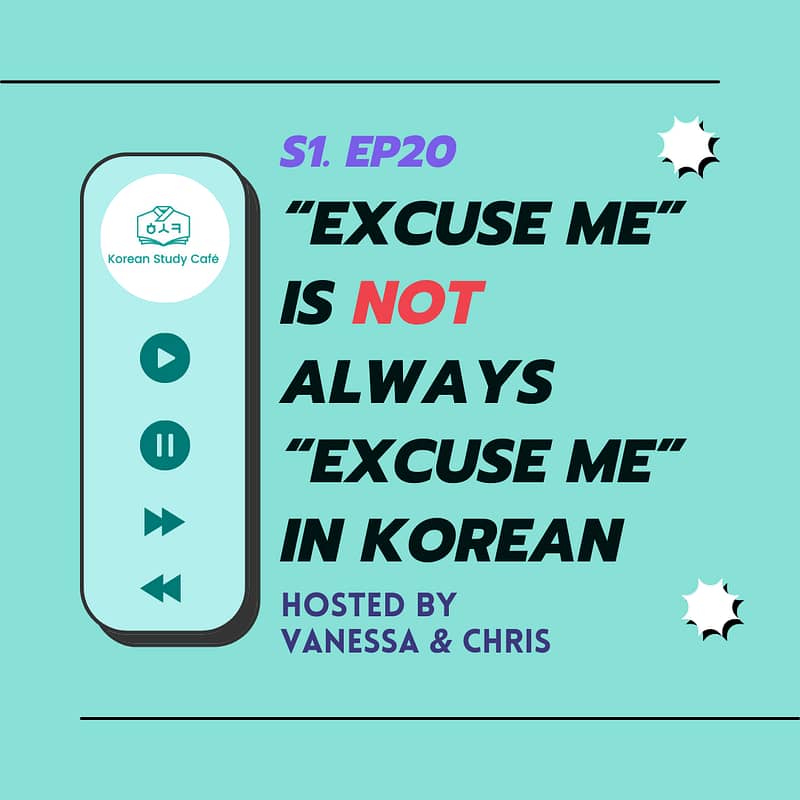Powered by RedCircle
20화: 실례합니다
Episode #20: Excuse me
Vanessa: Chris, how have you been?
Chris: Hey, pretty good as usual. By the way, why do you look so tired today?
Vanessa: Oh, I watched Kingdom Asin of the North late last night on Netflix, and I couldn’t sleep because I kept thinking about zombies and the storyline of the Kingdom series.
Chris: Vanessa, you shouldn’t watch zombies or scary movies before going to sleep. It’s tough to fall asleep right afterwards. Did you at least enjoy it? I thought it was an excellent spin-off episode of the Kingdom series.
Vanessa: Well, the plot was really good. However, since it is a spin-off episode, I was bummed that there is only one episode. Also, there weren’t many zombies compared to the original series, and it was less frightening and shocking.
Chris: Well… 실례하지만 전 그렇게 생각하지 않아요. 이번 스페셜 에피소드로 전체 시리즈의 배경을 알 수 있어서 전 더 좋았어요. Excuse me, but I disagree with you.
I actually liked it better because this spin-off episode presented the backstory of the whole series.
Vanessa: Yeah, But I want to watch it continuously. But as the whole plot had to be in one episode, it felt a bit rushed, and it was sad as there was nothing else to watch afterwards. The best part of being a Netflix series is to watch the whole series at once. Guess I miss that part of it.
Chris: Well… If that’s your reason, I agree with you.
Vanessa: Oh, by the way, Chris. There is an expression that I just wanted to correct.
Chris: Oh? What is it?
Vanessa: It is 실례하지만… excuse me but…
Chris: Isn’t 실례합니다Excuse me?
Vanessa: Yes, you are correct. However, when you try to use “Excuse me,” like how it is used in English, it creates awkwardness when you say it in Korean.
Chris: Oh! Could you explain when it is better to use different verbs?
Vanessa: For example, when trying to politely say that you do not agree with the other person or interrupting the other person’s statement, it is better to use the verbs like “미안하다 or 죄송하다” rather than “실례하다.”
Chris: 미안하다, 죄송하다? I’m Sorry? Aren’t those verbs used to apologize action? I don’t think that is right choice.
Vanessa: Right. Rather than saying that as an apology, it would be better to think of it as a habitual expression. Koreans use the verb 미안하다 or 죄송하다” at this situation but don’t put their apology emotions. Think as you would say, “Excuse me” in English when you counter-argue or give different opinions to a person’s statement.
Chris: Oh, okay. So it is more of a habitual expression rather than genuinely expressing the meaning.
Vanessa: Yes, that is correct. And in other cases, there are times when Koreans use the expression “실례합니다”. In English, it’s common to say “excuse me” when approaching someone you don’t know and start the conversation.
Chris: Right.
Vanessa: However, in Korean expressions like, “죄송한데 말씀 좀 묻겠습니다” or “죄송한데 뭐 좀 물어봐도 될까요” “I’m sorry, I want to ask you something” or “I’m sorry, can I ask you something” are used.
Chris: Oh, the phrase is a lot longer, and it expresses it with a straightforward meaning.
Vanessa: Yes, One of the Korean social cultures is where people don’t usually greet or have small talk with strangers. So when you need to talk to someone while you are on the street, you need to clearly deliver the message saying that “I have no other intentions, just have a question for you.” Or you might be misunderstood as a strange person.
Chris: Ah, yes, yes. When I first moved to Korea, I always greeted and tried to have small talk with strangers or neighbors in the elevators, supermarkets, or even in building hallways and most looked at me like a weirdo or walked away or even ignored me. There were very few cases when greeting or small talk continued in the elevator or hallways. It seems like Koreans generally don’t chat unless they have a social relationship.
Vanessa: Yes, That’s not to say that Koreans are reluctant to meet people, but Koreans rarely have small conversations with people they don’t know well due to its’ culture.
Chris: So that is why it is important to state exactly what you plan to do in advance. It makes total sense now. As always, today’s lesson was very valuable. So, shall we practice today’s lesson?
Vanessa: Yes, let’s do it!
#1
Chris: 바네사 씨 저희 집에 오는 건 처음이죠? Vanessa, is this your first time coming over to my house?
Vanessa: 네 맞아요. 하하 제가 산 집들이 선물을 마음에 들어할지 모르겠어요. Yes, I don’t know if you’ll like the housewarming gift I bought.
Chris: 아유. 그런 걱정은 하지 마세요. 얼른 들어오세요Aww. Don’t worry about that. Come in!
Vanessa: 네, 그럼 실례하겠습니다. Yes, may I? (Actually there is no direct translation in English)
#2
Vanessa: 죄송하지만 말씀 좀 물을게요. 혹시 여기 지하철 역이 어디에요? I’m sorry, but I’ll ask you something. Where is the subway station?
Chris: 아, 여기서 왼쪽으로 쭉 가시면 보이실 거예요. Turn left from here and go straight down, then you’ll see it
Vanessa: 아, 그렇군요. 감사합니다. I see. Thank you.
#3
Vanessa: 죄송하지만 저희 식당에서는 흡연하실 수 없습니다. We are sorry, but smoking is not allowed in our restaurant.
Chris: 네? 왜요? 다른 식당에서는 다 되는데 왜 안돼요? Oh? Why? It is allowed in other restaurants, so why not?
Vanessa: 저희는 모두 금연석만 있습니다. 죄송하지만 흡연은 야외에서 부탁드립니다. All of our seats are non-smoking. We are sorry, but please smoke outside of the restaurant.
Follow us on Instagram: KoreanStudyCafe.Offical
Follow us on Twitter: @KoreanStudyCafe




